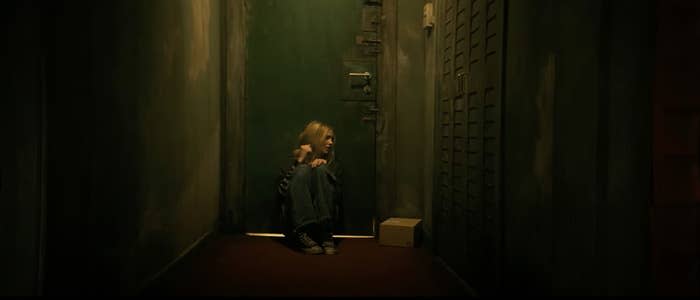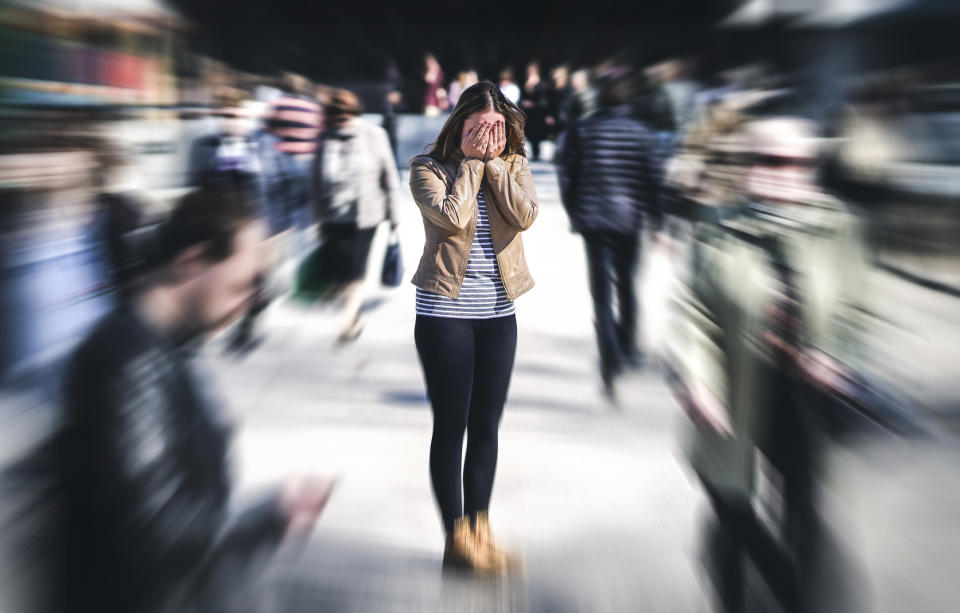We Don't Talk A Lot About Agoraphobia, But Some People Shared Their Experiences Here
Agoraphobia is defined as a type of anxiety disorder that involves fear and avoidance of places or situations that might cause panic and feelings of being trapped, helpless, or embarrassed.
It honestly isn't spoken about as widely as some other anxiety disorders, but it's back on some people's radars again because the main character in the movie Latency is shown as having acute agoraphobia.

In the main character, played by Sasha Luss, agoraphobia manifests as her not being able to leave her apartment. However, we know it can also look very different than this.
Recently we asked the BuzzFeed Community to share any experiences they had with agoraphobia, anything they wished people knew about it, or things that have helped them to cope. Here are a few of the responses:
"It’s not necessarily how TV and movies portray it. It’s not like I’m terrified to leave my house 24/7. It’s the intense fear of being trapped for me. It’s knowing that if I leave the house at certain times, I will be stuck in traffic with no way off the highway because traffic is backed up for miles until the next exit.
It could be going into a classroom (I used to just leave in high school) without the freedom to get up and use the bathroom without needing permission. Using public transport could mean that I don’t have the ability to flee a bad situation. Letting someone else drive to dinner means I can’t escape. Concerts or festivals watching from the front of the stage means I can’t just run away with so many people blocking my exit. Airports are more scary than the plane itself—I’m less afraid of a plane crash than being stuck in an airport because of a delayed flight. It makes no sense, most people do not understand it, and it makes me feel crazy."
"I've been agoraphobic for four and a half years. It's a progressive mental illness that gets worse with time. It's not being afraid of the sun or the sky or open spaces. It's a deep fear of unknown situations. It's not a mental illness that resides alone. It is fed by depression and anxiety. It takes a lot of hard work to make the smallest amount of progress. There's no simple 'take this pill and you'll be ok.'
When I try to leave the house, my whole nervous system goes into survival mode, which for me looks like a freeze state. I feel literally paralyzed. All I can do is sit in my head and think of all the things I should be doing. You life becomes a world of 'shoulds'. I hope I can edit this later to add more. I have so much more to say."
"I wish people wouldn't make the assumption that I don't want to do things. Or that I have it because of socializing but it's really rooted in a fear of fear. A fear of no easy escape. A fear of experiencing the symptoms. It's so draining and I just hope it becomes less stigmatized."

"I have had it for as long as I can remember (at least since 4-5 years old). For me it manifests as not being able to travel overnight. I can travel any distance but I gotta be sure that I will be home in the evening. And this is the 'improved' state. Some years ago it was still impossible for me to take a day trip to a different city, even if I knew that I would be home by the evening.
What I wish people understood is that we know, that there is no 'real' danger out there but that we still can't help it. And what helped me deal with it was:
1) The diagnosis 'this scary thing' suddenly had a name and made it 'touchable'.
2) Not trying to suppress it (I tried to [for a] long time because of people not understanding). I am not afraid anymore that it will break out because 'that must not happen'. I know it will happen, and I greet it 'as a friend'.
3) Yes it can happen again, but that will not be the end of the world and I will survive it."
"My agoraphobia manifests in situations where I feel I can’t escape. The subway stopping between stations, airplanes - a fear of not being able to escape the plane, traffic—if it’s not moving, and elevators. I didn’t have agoraphobia prior to five years ago.
Five years ago I made the mistake of taking magic mushrooms while I was at a cottage (on an island) with some friends. The experience put me into full blown panic for four hours—giving me the feeling that I couldn’t escape and this feeling would last forever. It was pure torture. The biggest problem wasn’t the experience of the incident itself—it’s how it affected me every day afterwards. Everyday I would slip into this panic for no reason—the same feeling I had while on the mushrooms. I’ve come a long way since. I was on 10 different psych meds and now I’m down to one. I’d love to hear others experiences of working through these fears."

So, what does a day in the life of someone with agoraphobia actually look like? Well, we know now that the answer is very different depending on who you ask. A former BuzzFeed writer once outlined her day-in-the-life experience with agoraphobia during the time she was housebound with it.
"When I was 21 I was a bright, slightly directionless graduate, with my own band, an extreme social life, and really interesting purple hair," the author explained in the article.
"Suddenly I started experiencing upsetting 'dizzy spells' whenever I was in an enclosed public space (bars, malls, on public transport).
These 'spells' were so severe that I'd frequently faint. I began to avoid the places that triggered them, and soon I found I couldn't leave the house at all without suffering acute attacks.
It turned out that these 'dizzy spells' were actually panic attacks, and the doctor diagnosed me with depression, panic disorder. and agoraphobia, and signed me off work. I had to quit my band and my shitty bar job and move back in with my parents to start therapy.
In total it took me four years (and one relapse) to learn to conquer panic attacks, get out of the house, and fully get over agoraphobia. Now, over a decade later, I travel freely without issue (although I still have to control my depression and anxiety)."
You can read the full story here.
It's hard to imagine that celebrities who are so often outside and in the public eye would struggle with agoraphobia, but some have spoken out about their struggle with the anxiety disorder as well. Zac Ephron is one of them.

“I just don’t go out,” he explained in an interview with Men's Health in 2022. “People in large groups, it triggers my agoraphobia.”
Kim Kardashian has also spoken about how she developed anxiety, and possibly agoraphobia, after she was robbed at gunpoint in her hotel in Paris.

"I feel like I had agoraphobia, definitely, after my robbery in Paris," she said in a Keeping Up With The Kardashians clip . "Like, definitely would stay in, hated to go out, I didn't want anyone to know where I was or be seen...I just had such anxiety."
All of which is to say: agoraphobia can look really different for different people, and the more we talk about it the more we can dispel some of the myths and make sure anyone who struggles with it can get the support and compassion they need.
If you feel like you may need help, National Alliance on Mental Illness helpline is 1-888-950-6264 (NAMI) and provides information and referral services.
GoodTherapy.org is an association of mental health professionals from more than 25 countries who support efforts to reduce harm in therapy.
If you have an experience you'd like to share, tell us in the comments.
Note: Some responses have been edited for length and/or clarity.


